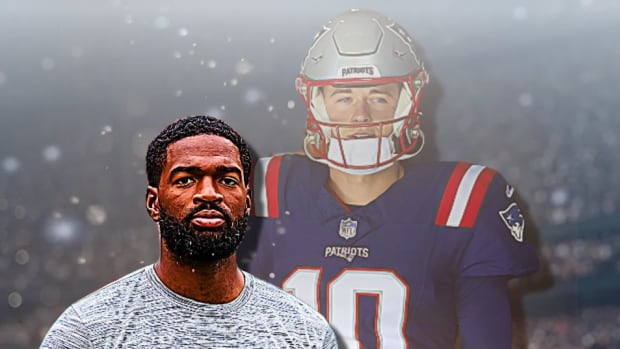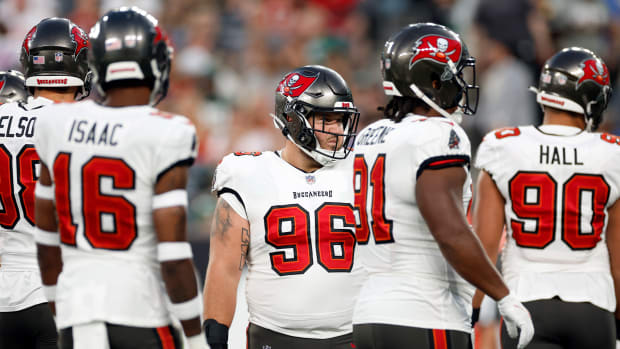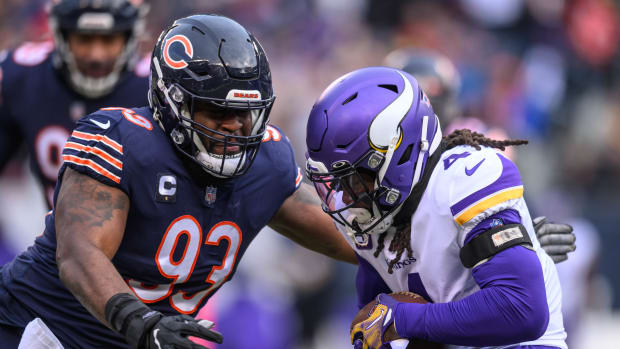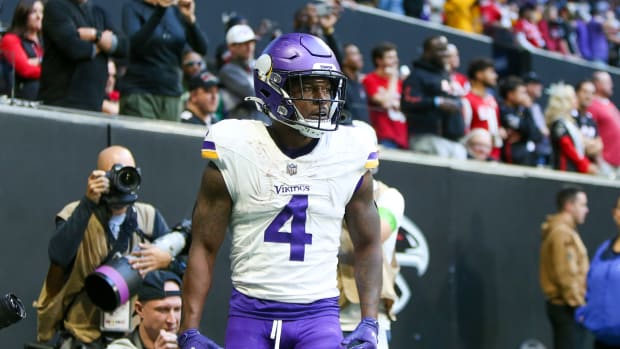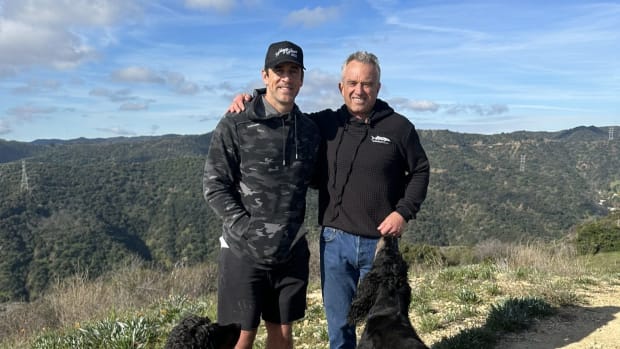NFL, the Queer Community and the Quiet Path to Acceptance
ATLANTA — It’s four days before the Super Bowl, and the floor of the Georgia World Congress Center is packed with broadcast sets, fans posing with the Lombardi Trophy and kids testing their speed in the 40-yard dash. Upstairs, in a quiet meeting space, another event, one you wouldn’t expect during the NFL’s biggest week of the year, is underway. Standing in the middle of a circle of chairs, a man begins a conversation.
“Hi, I’m Wade Davis,” he tells the room. “I’m a former NFL player. I’m also an openly gay man. While in the NFL, I wasn’t out about my sexuality. Part of my responsibility now is to work with organizations like yours and to partner with the NFL to create the conditions where we start to change the narrative that sports is a homophobic space.”
Gathered around him are about 30 teens and young adults who are clients of CHRIS 180, an Atlanta-based non-profit that offers housing, counseling and other social services to help individuals facing challenging circumstances get back on track. Most are homeless and living in group homes or transitional housing offered through the program. Many are part of the LGBTQ+ community.
As the evening progresses, some will share their personal stories about difficult experiences they’ve had as a result of their sexuality—being kicked out of their homes, estranged from their families or bullied by their peers—but first, Davis wants to get them comfortable. He begins with an icebreaker, prompting everyone to state their gender pronoun and a super power they’d like to have.
Davis asks the three other NFL players in the room to go first. Ryan O’Callaghan, the former Patriots and Chiefs offensive lineman who struggled with painkiller addiction and suicidal thoughts before a psychologist who worked with the Chiefs encouraged him to start coming out as gay to people close to him; Esera Tuaolo, a defensive lineman who kept his sexuality a secret until two years after he retired from the NFL; and Tony Richardson, a 17-year NFL fullback who was participating as an ally of the LGBTQ+ community.
The NFL has partnered with the You Can Play Project to host these “Hi-Five” events, intended to make LGBTQ+ youth feel welcomed in the sports community. They’ve quietly held them at the Pro Bowl, before a regular-season opener, at the NFL draft—and, for the first time this year, during Super Bowl week.
“I have learned more from all this than, really, anything else,” O’Callaghan tells the young adults gathered in the room. “I feel fortunate to get to talk to you guys and hear your stories. It’s really eye-opening for someone like me.”
It’s been five years since Michael Sam, the former Missouri defensive end, became the first publicly gay player to be drafted into the NFL. Sam did not make the Rams’ 53-man roster, and later had a brief stint on the Cowboys’ practice squad, but he never played in a regular-season game, which he has said led to anger and depression. The following year, in 2015, he signed with the CFL’s Montreal Alouettes but retired from professional football a few months later, citing mental health reasons. The NFL has not had another publicly gay player since Sam (Katie Sowers, offensive assistant for the 49ers, is the league’s only openly gay coach), but Davis pushes back against that being the only benchmark for inclusion.
“I get the impact of what it would mean to have an openly gay player,” Davis says, “but let’s take some incremental steps and not make this demand that a player not tell his teammates first, but tell the world. Because immediately this player becomes a “gay NFL player.” Michael Sam is a “gay NFL player”—no, Michael is an NFL player who is also gay … Imagine I am taking this identity you have had since you were 7, and now I changing that and saying, ‘Oh, you are that gay NFL player.’ How many of us would want to do that?”
Since 2012, Davis has worked with the NFL as an LGBT inclusion consultant. He has led or set up inclusion training sessions with about half the teams in the league, work he has also done with major corporations like Google and Netflix. He recalls one player, whom he did not know was gay at the time of the training, calling him afterward to tell him how important the session was in their locker room. Davis thought back to his own playing career, as a cornerback at Weber State and brief stints on the preseason rosters of three NFL teams. He struggled with internalized homophobia and wrestled with his own identity, and thought how smart it would have been to tell a few teammates he was close with, and trust that they would accept him.
“There are players right now who are open about their sexuality—they are open to their teammates, who are their family,” he says. “When I first told someone I was gay who did I tell first? My family. I didn’t go tell the media. So why is the ask of NFL players that they tell the entire world, where we don’t ask anyone else to do that same thing? The fact that there are players in the NFL right now who are open to their teammates, shouldn’t that be enough?”
The training sessions usually last about 90 minutes, but Davis recalls one with an NFL team that ended up going two-and-a-half hours on a Tuesday off-day during the season. The reason the session lasted so long, he says, is because players were honest about how they felt, and the fact that they were at different places in their understanding of sexual orientation and gender identity.
“If you are doing a training for 53 guys, and one of the guys said, ‘You know what, I am actually a little uncomfortable playing with a gay guy,’ can we not have space for that to be true?” Davis asks. “Can we not have space for this player to grow, to evolve, to say, ‘Well, I have actually never had an experience with someone who is LGBT, and the idea this guy is going to be in the shower with me makes me uncomfortable.’ Is that not a human experience? We in society can’t live in romance to think that everyone is going to be accepting of this at the exact same time.”
Davis has led presentations in front of NFL owners and with the NFL Referees Association. Another idea on his radar, spurred by a few instances in which draft prospects have been asked by teams about their sexual orientation, is developing a training module for NFL scouts and team employees that focuses on the kinds of questions they ask players in pre-draft interviews and the impact those questions can have. “They may not have intended to make someone feel like an other,” Davis says, “but the impact on someone is very real.”
Underlying all this work is the time Davis, his NFL peers and the You Can Play team spend in rooms like the one in Atlanta, asking LGBTQ+ teens and young adults who don’t play or work in the NFL, What do you need from us?
One of the first in the group to answer Davis’s question is 23-year-old Jaylon Couch. He says he was kicked out of his home by his father when he was 16. He relocated from Florida to Atlanta and lives in transitional housing offered through the CHRIS 180 program. Couch, who is gay, is studying graphic design at Georgia Piedmont Technical College.
“Use your platform to show that being your true self does equal happiness,” Couch says. “Promoting that by being your full self you are living a full life and living it in a positive way and that does bring true happiness in you.”
The bus that arrived at the Georgia World Congress Center was full of teens and young adults with a variety of backgrounds and reasons for attending. Sabrina Woodworth, a 19-year-old who also lives in CHRIS 180 housing, says she’d felt excluded from her high school tennis team because she identifies as pansexual. She recalls that some of her teammates expressed discomfort with being part of a same-sex doubles team with her, and was wondering if the NFL players had gone through anything similar. “After a while it started getting not O.K.,” she says. “It took a sport that I loved into something I cringed every day to go to.”
For the next hour, the members of the group take turns standing up and sharing their ideas and perspectives. One young woman says she hasn’t told some members of her family she was gay, because she thought they wouldn’t accept her due to their Christian faith. “We are taking one step forward now, because we are all sitting here and we are talking about it and feeling more comfortable,” she says. A straight male explained that he thought it was “weird” when Sam came out, because he didn’t know any gay men, until one of his peers in CHRIS 180, who identifies as gay, helped him understand more about different sexual orientations and gender identities. “Now I definitely respect it," he says.
“I like what you all are doing,” says another young man, “because it gives people a chance to get an understanding. Humans resent things they don’t understand … a lot of people commit hate crimes because they fear what they don’t understand. I like all of this, because it gives people a visual from both sides. Even though I am not a gay person or a bi man, I can sit in a room with 30 people who are part of the community, and we can all be together in unison.”
Soon, dinner is being carried in, and the CHRIS 180 group will head downstairs to explore the NFL Experience. But first, Davis thanks everyone in the room for being vulnerable and connecting with each other over shared experiences.
“The last thing I want to say is, let’s never think that homophobia is located anywhere, specifically,” Davis says. “Homophobia is everywhere. Black folks are not more homophobic than white folks. The church is not more homophobic than another church. Homophobia is made up of people. People are homophobic, right? And the institutions can become that. Part of our work here is to show that the NFL is a space that is valuing and is building networks of support for people who identify as LGBTQ+.”
Davis has spent most of this decade working on that goal. It’s in places like this where he hopes headway is being made—behind a closed door and out of the public glare, where a person’s individual experience doesn’t feel quite so singular.
• Question or comment? Email us at talkback@themmqb.com.

































